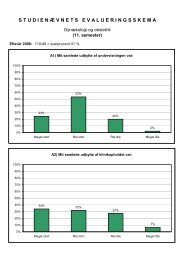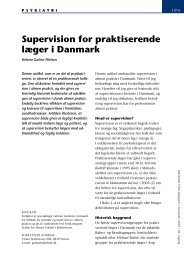shared deliberate practice
shared deliberate practice
shared deliberate practice
You also want an ePaper? Increase the reach of your titles
YUMPU automatically turns print PDFs into web optimized ePapers that Google loves.
Shared Deliberate Practice 219same difficult shots and correct mistakes repeatedly. Thus, whole game training is not a<strong>deliberate</strong> <strong>practice</strong> because this often encourages players to“rely on well-entrenched methodsrather than exploring alternative methods” (Ericsson, 1993, p. 368). In summary, for matchtraining to be effective, time and space for <strong>shared</strong> <strong>deliberate</strong> <strong>practice</strong> is necessary.The players in this study emphasize that match training actually offers opportunities forexploring alternative ways of handling a game situation. For instance, Sofie says that matchtraining teaches the players something that cannot be completely learned in highly structuredtraining situations.It is in these situations [match training] you are allowed to think for yourself,because a lot of opportunities turn up from players being dragged. And we make gaps foreach other, which means that there are more opportunities than if you are just glued infront of one defender [constrained by structured training activities]. (Sofie)Although Sofie acknowledges the importance of repeating <strong>shared</strong> movement patterns andteam coordinate response during structured tactical training, she tells that players encountersituations during match training that cannot be replicated in the structured training. Katrineemphasizes the importance of match-play without being restricted to following pre-arrangedtactics, because these less restricted game-situations force the players to develop <strong>shared</strong>patterns of movement “out of nothing”. This is based on the players’ “feel for each other”,which can be interpreted as a demanding type of team situation awareness where team playersneed to make up <strong>shared</strong> understandings on the spot. This way match training teaches theplayers to become responsive to the unpredictability of the game.In summary, studying <strong>deliberate</strong> <strong>practice</strong> in a team context reminds us that it is not onlythe individual player’s flexibility and decision-making-skills that are developed during matchtraining, but also the team situation awareness and dynamic decision-making skills.What Characterizes Shared Deliberate Practice?As might be glimpsed in the foregoing, the players found that the quality of the training,whether structured tactical training or match training depends on <strong>shared</strong> <strong>deliberate</strong> <strong>practice</strong>.The analysis found that two key elements in <strong>shared</strong> <strong>deliberate</strong> <strong>practice</strong> are (1) concentrationand (2) feedback from coach and role-models. These elements constitute a <strong>shared</strong> enterprisethat supports the following team cognitive skills: team coordination, team situation awarenessand <strong>shared</strong> understanding. First we analyze concentration and feedback as <strong>shared</strong> <strong>deliberate</strong><strong>practice</strong>s. Second we delineate the above team cognitive skills.The argument is that <strong>deliberate</strong><strong>practice</strong> is <strong>shared</strong> between team players as individuals and at team level, and that teamcognitive skills are socially negotiated skills in the sense that they are developed within aspecific sport context of team training.ConcentrationFull concentration is one of the characteristics of <strong>deliberate</strong> <strong>practice</strong> (Ericsson 2006, p.696). The point is that the quality of team training rests on the extent to which all teamplayers are performing in a concentrated way. Katrine and Mette voiced their concerns that
















